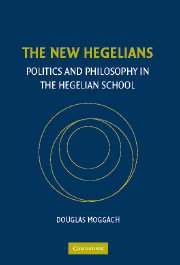Book contents
- Frontmatter
- Contents
- Acknowledgements
- Contributors
- Introduction: Hegelianism, Republicanism, and Modernity
- 1 Eduard Gans on Poverty and on the Constitutional Debate
- 2 Ludwig Feuerbach's Critique of Religion and the End of Moral Philosophy
- 3 The Symbolic Dimension and the Politics of Left Hegelianism
- 4 Exclusiveness and Political Universalism in Bruno Bauer
- 5 Republican Rigorism and Emancipation in Bruno Bauer
- 6 Edgar Bauer and the Origins of the Theory of Terrorism
- 7 Ein Menschenleben: Hegel and Stirner
- 8 ‘The State and I’: Max Stirner's Anarchism
- 9 Engels and the Invention of the Catastrophist Conception of the Industrial Revolution
- 10 The Basis of the State in the Marx of 1842
- 11 Marx and Feuerbachian Essence: Returning to the Question of ‘Human Essence’ in Historical Materialism
- 12 Freedom and the ‘Realm of Necessity’
- 13 Work, Language, and Community: A Response to Hegel's Critics
- Bibliography
- Index
5 - Republican Rigorism and Emancipation in Bruno Bauer
Published online by Cambridge University Press: 22 August 2009
- Frontmatter
- Contents
- Acknowledgements
- Contributors
- Introduction: Hegelianism, Republicanism, and Modernity
- 1 Eduard Gans on Poverty and on the Constitutional Debate
- 2 Ludwig Feuerbach's Critique of Religion and the End of Moral Philosophy
- 3 The Symbolic Dimension and the Politics of Left Hegelianism
- 4 Exclusiveness and Political Universalism in Bruno Bauer
- 5 Republican Rigorism and Emancipation in Bruno Bauer
- 6 Edgar Bauer and the Origins of the Theory of Terrorism
- 7 Ein Menschenleben: Hegel and Stirner
- 8 ‘The State and I’: Max Stirner's Anarchism
- 9 Engels and the Invention of the Catastrophist Conception of the Industrial Revolution
- 10 The Basis of the State in the Marx of 1842
- 11 Marx and Feuerbachian Essence: Returning to the Question of ‘Human Essence’ in Historical Materialism
- 12 Freedom and the ‘Realm of Necessity’
- 13 Work, Language, and Community: A Response to Hegel's Critics
- Bibliography
- Index
Summary
Anyone seeking to defend Bruno Bauer's republican credentials faces formidable obstacles, many of them erected by Bauer himself. His notorious opposition to claims for Jewish emancipation in Prussia; the critical, indeed often supercilious tone of his journals, the Allgemeine Literatur Zeitung and the Norddeutsche Blätter (NDB), where he castigated the political and ethical shortcomings of currents resisting the Restoration regime: These and other attitudes contribute to the longstanding impression of Bauer as a renegade from the progressive movement, or as entirely alien to its spirit. Marx's depictions of him in the Holy Family and the German Ideology powerfully reinforce this image. David Leopold has recently made a persuasive case, based on careful textual analysis, that Bauer's negative stance on Jewish emancipation disqualifies him as a republican thinker. This was a view shared by many of Bauer's own contemporaries.Some of the immediate consequences can be seen in the narrowing circle of his literary and political collaborators. Ernst Barnikol has pointed to the small group of contributors to the NDB and attributes Bauer's frequent use of pseudonyms in this publication to a concealment of this fact, as well as to an effort to circumvent the censor.
Yet the dominant interpretation is difficult to sustain when we examine other writings by Bauer from the period 1840–9. His ongoing, even exacerbated problems with censorship alert us to the fact that he remained highly suspect to the authorities. They had good reason for their concerns.
- Type
- Chapter
- Information
- The New HegeliansPolitics and Philosophy in the Hegelian School, pp. 114 - 135Publisher: Cambridge University PressPrint publication year: 2006
- 5
- Cited by



